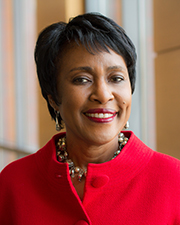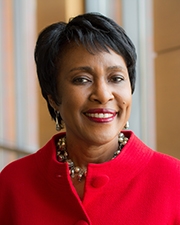Vivian Gadsden elected to National Academy of Education

The National Academy of Education (NAEd) announced that 14 exceptional education scholars were elected to membership, including Vivian Gadsden, William T. Carter Professor of Child Development and Education in Penn GSE’s Literacy, Culture, and International Education Division. This honor comes as Gadsden nears the end of her term as President of the American Educational Research Association (AERA).
“The election of new members to the Academy is a testament to their scholarly contributions in a wide range of areas, and to our abiding commitment to infuse education policy debates with knowledge from research. It is a pleasure and honor to welcome them,” said Dr. Michael Feuer, President of NAEd, in an announcement on February 28th. An induction ceremony for new members will take place during the 2017 NAEd Annual Meeting Dinner in November.
“Election to the Academy is both a tremendous honor and a testament to the impact of Vivian’s work on the field,” Penn GSE Dean Pam Grossman said. Grossman herself is a member, as are former Dean Andy Porter, Professor Emerita Diana Slaughter-Kotzin, and Penn President Amy Gutmann, a secondary faculty member of Penn GSE.
Dr. Gadsden began her career teaching developmental English, reading, and educational psychology at Oakland and Wayne State Universities in Michigan. A former Spencer Foundation/National Academy of Education postdoctoral fellow, Dr. Gadsden served as associate director in the National Center on Adult Literacy for six years. In 1994, she became the director of the newly founded National Center on Fathers and Families, an interdisciplinary policy research center focused on child and family well-being. In 2006, she was named the William T. Carter Professor in Child Development and Education.
Dr. Gadsden’s research interests include the cultural and social factors affecting learning and literacy across the life-course and within families, particularly those at the greatest risk for academic and social vulnerability. Her writing focuses on intergenerational learning, particularly on the relationships between literacy in families and issues of culture, race, gender, and poverty in diverse learning contexts. Her research studies examine the intergenerational and cross-cultural nature of learning, literacy, and identity within families and the relationship between family members' beliefs and practices around learning, educational access, and educational persistence. Her conceptual framework, family cultures, explores the interconnectedness among families' political, cultural, and social histories and racialized identities.
The NAEd consists of 209 U.S. members and 11 foreign associates who are elected on the basis of outstanding scholarship related to education. Nominations are submitted by individual Academy members once a year for review and election by the organization’s membership. In addition to serving on expert study panels that address pressing issues in education, members are also deeply engaged in NAEd’s professional development programs such as the NAEd/Spencer Postdoctoral Fellowship Program and the NAEd/Spencer Dissertation Fellowship Program.

